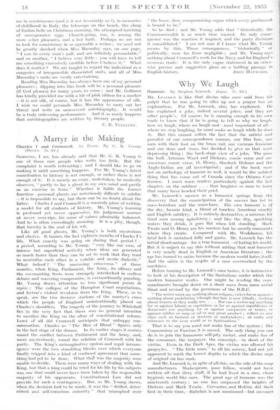A Martyr in the Making
Charles I and Cromwell. An Essay. 13y C, M. Young: (Davies. 7s. 6d.) SomEoss, I see, has already said that Mr. G. M. Young is One of those rare people who write too little. But the complaint is worth reiterating ; and I should like to go on Making it until something happens. For Mr. Young's latest contribution to history is not enough, or rather there is not enough of it. It is merely an essay, undertaken, he modestly obServes, " partly to lay a ghost in my own mind and partly as an exercise in form." Whether it fulfils the former function—personal ghosts are notoriously difficult to subdue -t-it is impossible to say, but there can be no doubt about the hitter. Charles. I and Cromwell is a masterly piece of writing, a model for all students of history. Mr. Young's learning is profound yet never oppressive, his judgement mature ut never over-ripe, hiS sense of values admirably balanced. And lie is often exceedingly amusing.- It is a:pity, though], that brevity is the soul of his wit. Like all good ghosts, Mr. Young's is both mysterious and elusive. It haunts the last eighteen months of Charles I's life. What exactly was going on during that period ? :— IL period, according to Mr. Young, " very like our. own, of intense but superficial activity when ideas are generated so much faster than they can be set to work that they tend to neutralise each other in a voluble and sterile dialectic." What indeed ? " The unceasing criss-cross " of those months, when King, Parliament, the Army, its officers and the 'covenanting Scots were strangely interlocked in endless debate and wavering coWiprotWise,,is extraordinarily puzzling. Mr. ; Young draws. attention: to two significant points de re*re : The collapse of the Hampton Court negotiations, and Ireton's :violent revulsion from' the King. These, so to speak, are the two decisive stations of the martyr's cross which the people of England unintentionally placed on Charles's shoulders. The 'tragedy of the journey to Whitehall lies 'in the very fact that there was no general intention to sacrifice the King on the altar of constitutional reform, Least of all did Cromwell anticipate that unhappy eon- summation. Charles as " The • Man of Blood " figures only in the last stage of the drama. In its earlier stages it centres round the conflict between Parliament and the Array; and, more mysteriously, round the relation of Cromwell with his
• party. The -King's unimaginative egoism and regal . intrans- igence were the two stumbling blocks over which everyone finally tripped into a kind of confused agreement that some- thing had got to be done. What that was the majority were unable to decide. There were many ways of dealing with the King, but that a king could be tried for his life by his subjects Was one that could never have been taken by the responsible majority of his opponents. Constitutional Law did not provide for such a contingency. But, as Mr. Young shows, when the decision had to be made, it was the " drilled, deter- mined • and self-conscious minority " that triumphed 'over - " the loose, slow, compromising organ which every parliament is bound to be." .
So lie 'died ; and Mr. Young adds that " historically, the Commonwealth is so much time wasted. Its only conse- quence was the reaction it inspired, and the party divisions it consolidated." I am not sure if I know what Mr. Young means by this. Those consequences, " historically " or politically, were far from negligible ; and Mr. Young says nothing about Cromwell's work for the Navy and for England's overseas trade. It is the only vague statement in an other- wise precise and suggestive gloss on a baffling passage in






























































































 Previous page
Previous page